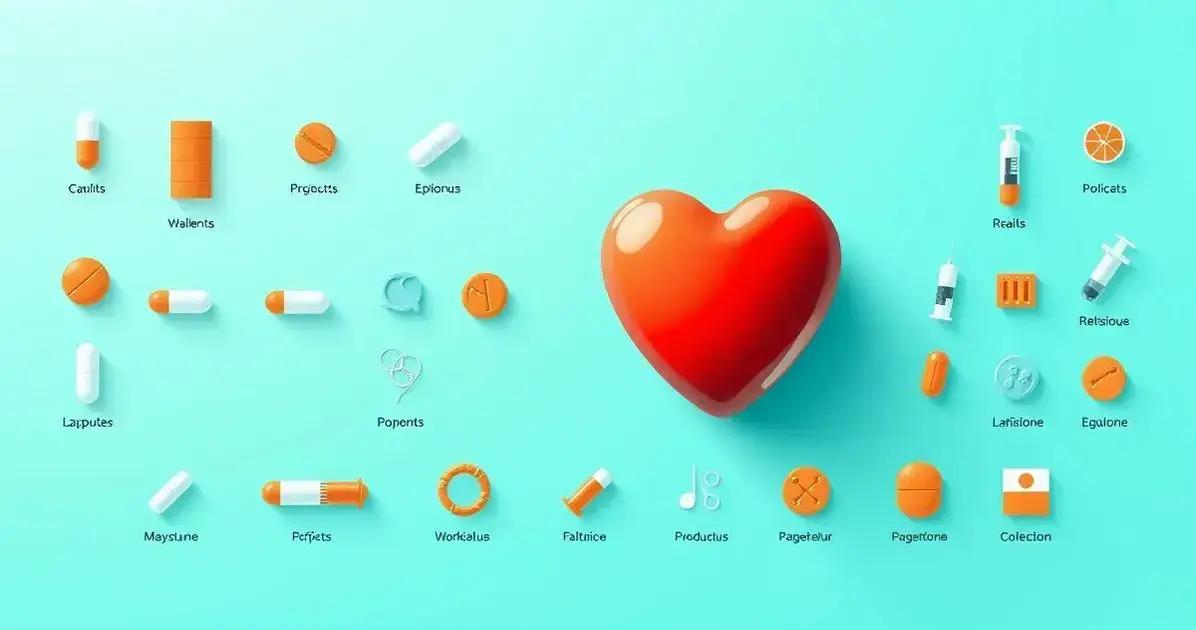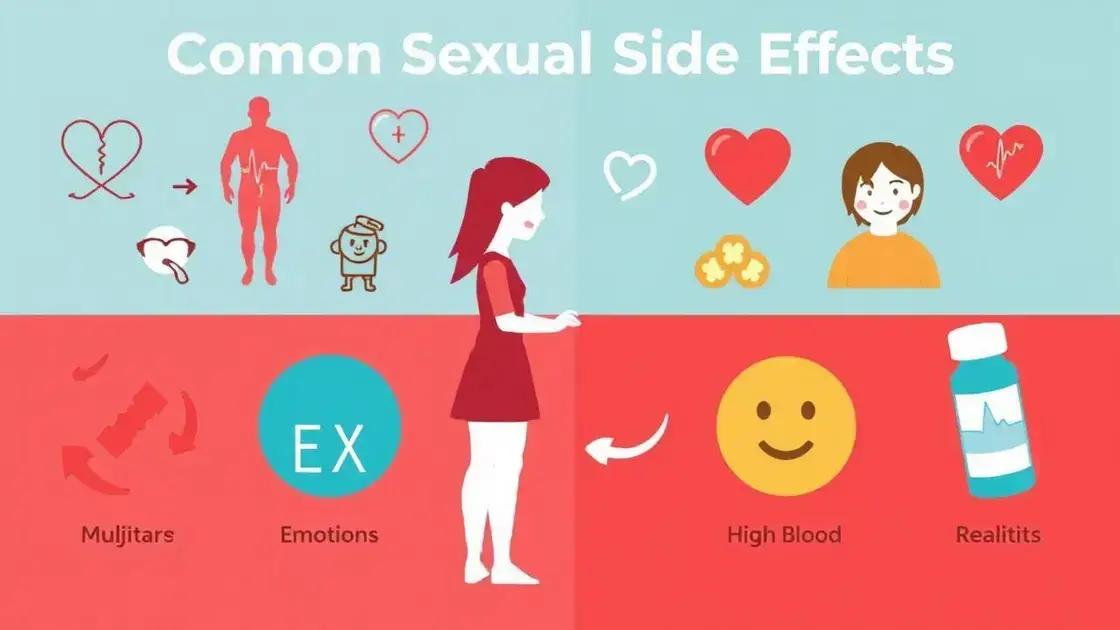The effects of high blood pressure medications on sexual health can include decreased libido, erectile dysfunction, and difficulties with arousal. It is important to communicate openly with your doctor about any sexual health concerns, explore alternative medications, and consider lifestyle changes or natural supplements to improve sexual wellness while managing blood pressure effectively.
Understanding the effects of high blood pressure medications on sexual health is crucial for many patients. While these medications can effectively manage hypertension, they may lead to unintended sexual side effects. In this article, we will delve into how these medications impact sexual function, discuss common side effects, and offer guidance on addressing any concerns with healthcare providers.
Understanding High Blood Pressure Medications

Understanding high blood pressure medications is essential for anyone prescribed these drugs. These medications help control blood pressure, which is vital for reducing the risk of heart attacks and strokes. There are various types of high blood pressure medications, including diuretics, ACE inhibitors, beta-blockers, and calcium channel blockers. Each class works differently to lower blood pressure.
Types of High Blood Pressure Medications
1. Diuretics: These medications help the body remove excess sodium and water through urine, which lowers blood pressure. Common diuretics include hydrochlorothiazide and furosemide.
2. ACE Inhibitors: These drugs block the production of a hormone that narrows blood vessels. By relaxing the blood vessels, ACE inhibitors like lisinopril and ramipril lower blood pressure.
3. Beta-Blockers: These medications reduce the heart rate and the force of the heart’s pumping action. Medications such as metoprolol and atenolol are commonly used beta-blockers.
4. Calcium Channel Blockers: They prevent calcium from entering heart and blood vessel cells, promoting relaxation and lowering blood pressure. Examples include amlodipine and verapamil.
How These Medications Work
By understanding how these medications operate, patients can better manage their health. The choice of medication can depend on various factors such as age, other health conditions, and potential side effects. It’s important to work closely with healthcare providers to determine the most appropriate medication for individual needs.
Monitoring and Adjusting Treatment
Regular monitoring of blood pressure is essential when taking these medications. Patients should report any unusual side effects to their doctors. Sometimes, it may take time to find the correct medication or dosage.
Understanding high blood pressure medications not only aids in managing hypertension but also helps individuals make informed decisions about their overall health and well-being.
How Medications Affect Sexual Function

How medications affect sexual function is an important topic for many individuals taking high blood pressure medications. While these drugs are essential for managing hypertension, they can also lead to various sexual health issues.
Common Effects on Sexual Health
Some people might experience a decrease in libido, or sexual desire, when taking certain high blood pressure medications. This effect can be linked to changes in hormonal balance or blood flow.
Erectile Dysfunction (ED) is another significant concern. It is the inability to maintain an erection, which can be frustrating and impact one’s self-esteem and relationships. Many people do not realize that medications like beta-blockers and diuretics can contribute to this issue.
Women and Sexual Function
Women can also experience sexual side effects. Some might notice a decrease in arousal or difficulty achieving orgasms. The effects on female sexual function can result from both hormonal changes and altered blood flow.
Understanding the Mechanism
The way a medication influences sexual health often depends on how it affects blood vessels. High blood pressure medications can sometimes restrict blood flow to the genitals, impacting sexual response.
It is essential to communicate with a doctor about any sexual health issues that arise. Understanding the specific medication one is taking and its side effects can help in managing these challenges effectively.
Managing Sexual Health While on Medication
Open dialogue with healthcare providers is crucial. They can suggest alternatives or complementary treatments to help mitigate sexual side effects. This might include lifestyle changes, such as exercise or dietary adjustments, to improve overall health and sexual function.
Being proactive about sexual health while managing high blood pressure is important for long-term well-being.
Common Side Effects on Sexual Health

Common side effects on sexual health associated with high blood pressure medications can have a significant impact on quality of life. Understanding these effects is important for those who are prescribed these treatments.
1. Decreased Libido
A decrease in sexual desire, or libido, can occur when taking certain blood pressure medications. This can be frustrating and may lead to emotional distress for both partners.
2. Erectile Dysfunction (ED)
Erectile dysfunction is a frequent side effect for men on these medications. It can make it difficult to achieve or maintain an erection, impacting self-esteem and intimate relationships.
3. Arousal Difficulties
Women may also experience challenges with sexual arousal. Some women find it harder to become physically aroused, which can affect their sexual satisfaction.
4. Orgasm Difficulties
In some cases, individuals may find it harder to reach orgasm. This can lead to frustration and feelings of inadequacy during sexual experiences.
5. Changes in Blood Flow
High blood pressure medications can influence how blood flows throughout the body, including the genitals. This can lead to reduced sensation and pleasure during sexual activities.
It’s important to talk openly with healthcare providers about any sexual side effects experienced. Addressing these issues can lead to more effective management of both blood pressure and sexual health.
Addressing Concerns with Your Doctor

Addressing concerns with your doctor is an important step if you experience side effects from high blood pressure medications. Open communication can help ensure your treatment is effective and tailored to your needs.
1. Be Honest About Your Symptoms
When visiting your doctor, it is essential to share any sexual health issues you may be experiencing. This includes decreased libido, erectile dysfunction, or arousal difficulties. Your doctor needs to know to provide the best care.
2. Ask Questions
Do not hesitate to ask your doctor questions about your medications and their potential side effects. Understanding how the medications work can help you feel more in control. Questions like, “Are there alternatives?” or “How long will these side effects last?” can lead to valuable information.
3. Discuss Any Changes
If you notice any changes in your sexual health after starting a new medication, it is crucial to report this to your healthcare provider. Changes may indicate that a medication is affecting your body differently than expected.
4. Explore Treatment Options
Your doctor may suggest alternative medications or additional treatments to mitigate sexual side effects. Sometimes, lifestyle changes such as diet, exercise, and counseling can also benefit sexual health.
5. Keep a Journal
Recording your experiences with the medication can help facilitate your discussions with your doctor. Note any side effects, when they occur, and how they affect your life. This information can be helpful in making informed decisions about your treatment.
Remember, discussing sexual health concerns with your doctor is vital for your overall well-being. It helps ensure you receive the most appropriate care tailored to your needs.
Exploring Alternatives for Better Sexual Health

Exploring alternatives for better sexual health is essential for individuals experiencing side effects from high blood pressure medications. Various options can help improve sexual well-being without compromising blood pressure control.
1. Medication Adjustments
Consulting your healthcare provider about alternative medications can be a good first step. Some medications may have fewer sexual side effects. For instance, certain ACE inhibitors or calcium channel blockers may be less likely to impact sexual function.
2. Lifestyle Changes
Adopting healthy lifestyle changes can improve overall sexual health. Regular physical activity, a balanced diet, and maintaining a healthy weight can enhance blood flow and boost energy levels.
3. Stress Management
Stress can significantly affect sexual desire and performance. Engaging in stress-reducing activities such as yoga, meditation, or deep breathing exercises can be beneficial.
4. Counseling or Therapy
If emotional issues affect sexual health, seeking the help of a counselor or therapist can provide valuable support. Therapy can help couples improve communication and manage anxiety related to sexual performance.
5. Natural Supplements
Some natural supplements, like L-arginine, ginseng, or horny goat weed, are thought to improve sexual function. However, it is crucial to consult with a healthcare provider before starting any supplements.
By discussing these alternatives with a doctor, individuals can find effective ways to enhance their sexual health while managing their blood pressure effectively.
In summary, understanding the impact of high blood pressure medications on sexual health is crucial.
These medications, while essential for managing blood pressure, can lead to various sexual health issues, including decreased libido, erectile dysfunction, and difficulties in arousal.
It’s important to address these concerns openly with your doctor, ensuring that you explore alternatives and adjustments that can help maintain both your blood pressure and sexual health.
By implementing lifestyle changes, considering medication adjustments, and seeking support through counseling or natural supplements, individuals can enhance their sexual well-being and improve their overall quality of life.
Ultimately, proactive communication and a comprehensive approach to health can lead to better sexual health and a fulfilling relationship.
FAQ – Frequently Asked Questions About High Blood Pressure Medications and Sexual Health
What are the common side effects of high blood pressure medications on sexual health?
Common side effects include decreased libido, erectile dysfunction, and difficulties with arousal or achieving orgasm.
How can I discuss sexual health concerns with my doctor?
Be honest about your symptoms and ask questions regarding the medications you’re taking. Open communication is essential for effective treatment.
Are there alternative medications that have fewer sexual side effects?
Yes, alternative medications such as certain ACE inhibitors or calcium channel blockers may have fewer impacts on sexual function. Consult with your doctor for options.
What lifestyle changes can improve sexual health?
Regular exercise, a healthy diet, stress management techniques, and maintaining a healthy weight can enhance sexual health.
Are there natural supplements that can help with sexual function?
Some natural supplements like L-arginine, ginseng, and horny goat weed may improve sexual function, but always consult your healthcare provider before starting any supplement.
How can therapy or counseling help with sexual health issues?
Therapy can address emotional concerns and improve communication between partners, helping to alleviate anxiety related to sexual performance.













